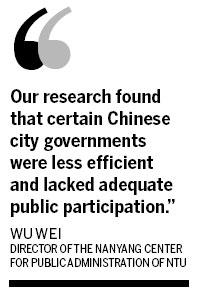First-tier cities fail to satisfy residents
Updated: 2011-11-24 08:00
By Wang Hongyi (China Daily)
|
|||||||||

SHANGHAI - China's first-tier cities have failed to satisfy their residents in building service-oriented government, even as they play crucial roles in national politics and economy, according to a report released on Wednesday.
The report, jointly compiled by Singapore's Nanyang Technological University (NTU) and China's Shanghai Jiao Tong University, aims to track how satisfied Chinese citizens and businesses are with government service.
A survey of 25,222 citizens and 3,203 enterprises was conducted from April to June in 32 major cities.
The research team defines a service-oriented government as one that embodies key indicators such as being corruption-free, efficient, transparent and democratic.
Besides these, indicators include the level of trust the public posits in the government, the participation of citizens and businesses in policy-making and implementation, and the quality of information service provided by the government.
Shanghai, Beijing, Guangzhou and Shenzhen, the four cities regarded as China's first-tier cities in terms of political and economic influence, were not found to have satisfied their residents to a great extent, and did not make it to the top 10 list.
Xiamen, Fujian province, emerged on top of the list, followed by Qingdao, Suzhou, Jinan, Changsha, Chongqing, Ningbo, Shijiazhuang, Guiyang and Changchun.
"Economic development can bring more material guarantee for providing public services, but, in most cases, such economic advantages cannot convert to public satisfaction with government service," said Wu Wei, director of the Nanyang Center for Public Administration of NTU.
"Our research found that certain Chinese city governments were less efficient and lacked adequate public participation."
Putting undue stress on economic development while neglecting the balanced development of governing ability and social service will have a negative effect on building efficient government, he said.
Wu also indicated the importance of the Internet for building service-oriented government.
In China, the booming micro blog, or Weibo, was becoming an important channel for communication between the public and government as more Chinese government departments were resorting to micro blogs to communicate with the public, he said.
So far, more than 10,000 government departments and over 8,600 government officials have opened micro-blog accounts at Weibo.com, a major micro-blogging platform in China.
However, "there are various problems, for example, many government departments are very slow in updating information, they use bureaucratic language and there is a lack of interaction with the public," said public opinion research expert Xie Yungeng.
China Daily
(China Daily 11/24/2011 page4)










